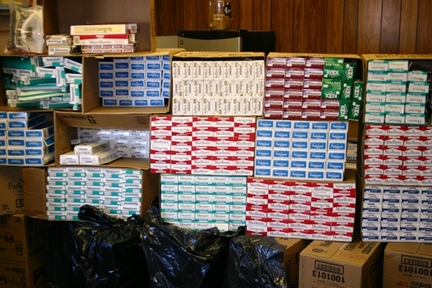 The FBI recently announced that 9 Baltimore County residents and two New Yorkers have been indicted on federal drug and conspiracy to traffic contraband cigarette charges. The contraband cigarette allegations are definitely not part of your run of the mill federal criminal case. But just because cigarettes are legal does not mean they can’t be the subject of a highly profitable scam. In fact, the FBI alleged that the illegal tobacco trafficking ring netted upwards of 6 million dollars for the co-conspirators. All but one of the defendants face up to five years for the tobacco charges, and some were also indicted on charges for conspiracy to traffic oxycodone and money laundering. The scam was highly profitable for an extended period of time, but like most theft schemes, it all came crashing down as the defendant’s became too profit hungry and dead set on raking in large amounts of cash. The indictment came back from the grand jury last week, and was unsealed yesterday after the arrest of 8 defendants, and the execution of 12 search warrants. Contained within the indictment are the details of just how the Pikesville and Owings Mills residents teamed up with two New Yorkers to carry out their scam.
The FBI recently announced that 9 Baltimore County residents and two New Yorkers have been indicted on federal drug and conspiracy to traffic contraband cigarette charges. The contraband cigarette allegations are definitely not part of your run of the mill federal criminal case. But just because cigarettes are legal does not mean they can’t be the subject of a highly profitable scam. In fact, the FBI alleged that the illegal tobacco trafficking ring netted upwards of 6 million dollars for the co-conspirators. All but one of the defendants face up to five years for the tobacco charges, and some were also indicted on charges for conspiracy to traffic oxycodone and money laundering. The scam was highly profitable for an extended period of time, but like most theft schemes, it all came crashing down as the defendant’s became too profit hungry and dead set on raking in large amounts of cash. The indictment came back from the grand jury last week, and was unsealed yesterday after the arrest of 8 defendants, and the execution of 12 search warrants. Contained within the indictment are the details of just how the Pikesville and Owings Mills residents teamed up with two New Yorkers to carry out their scam.
Continue reading →
Articles Posted in Federal Crimes
Federal Drug Enforcement Targets Two Maryland Counties
In a recent press release the Office of the National Drug Control Policy announced the expansion of a program designed to promote collaboration between federal state and local law enforcement. The White House oversees the Office, whose mission is to combat drug trafficking and production in areas that have been identified as hot spots throughout the country. These hot spots have been labeled as high intensity drug trafficking areas or HIDTA, and have been areas of law enforcement focus since Congress created the program back in 1988. As of November 14th of this year the White House has officially added two Maryland counties to the HIDTA list. Frederick County and Cecil County will now receive the same support as the other 28 HIDTA areas in 46 states throughout the country. The support will allow Frederick and Cecil to receive federal resources including manpower, money, and intelligence. As much as $660,000 has already been earmarked for the newly designated areas, and local law enforcement in these counties should begin to see the influx of resources over the next few months.
Continue reading →
Feds Shift Stance On Marijuana
 We recently posted an article about a notable medical personality and University of Michigan grad Dr. Sanjay Gupta shifting his stance on marijuana. Although the influential celebrity doc came out with strong public support for legalizing medical marijuana, his revised stance will have little direct affect on state and federal laws. But just last week a politician, whose stance on the topic will affect state and federal pot policy, voiced a similar change of heart. Attorney General Eric Holder informed the governors of Colorado and Washington that the Department of Justice will not seek to override their state’s new marijuana decriminalization laws. The Fed’s top prosecutor and his staff also issued a memo to each of the assistant United States attorneys, which clearly spells out the revised guidelines for handling marijuana cases on the federal level. The memo describes eight points of emphasis, and not surprisingly simple possession didn’t make the cut.
We recently posted an article about a notable medical personality and University of Michigan grad Dr. Sanjay Gupta shifting his stance on marijuana. Although the influential celebrity doc came out with strong public support for legalizing medical marijuana, his revised stance will have little direct affect on state and federal laws. But just last week a politician, whose stance on the topic will affect state and federal pot policy, voiced a similar change of heart. Attorney General Eric Holder informed the governors of Colorado and Washington that the Department of Justice will not seek to override their state’s new marijuana decriminalization laws. The Fed’s top prosecutor and his staff also issued a memo to each of the assistant United States attorneys, which clearly spells out the revised guidelines for handling marijuana cases on the federal level. The memo describes eight points of emphasis, and not surprisingly simple possession didn’t make the cut.
Continue reading →
Corrections Officer Pleads Guilty To Racketeering
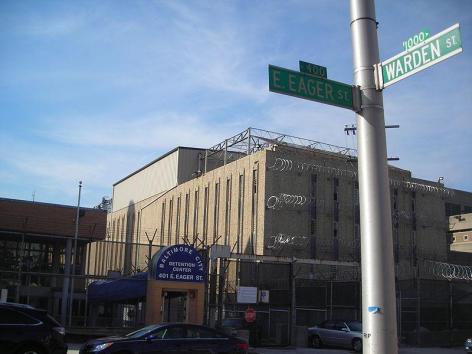 The first of 13 female corrections officers indicted on numerous federal charges earlier this spring has pleaded guilty to racketeering. The indictments came after a lengthy investigation by state and federal law enforcement into the highly profitable drug and contraband smuggling operations that were running rampant in the Baltimore County Detention Center. The indictments, which made national headlines a few months ago, alleged that corrections officers and inmates, particularly inmates of a notorious street gang, conspired to introduce various drugs such as oxycodone, suboxone, and marijuana into the jail population. After the contraband was smuggled through security, the gang members would sell it to other inmates. The gang members and their associates would also sell tobacco, cellphones, and other drugs such as cocaine and heroin. This particular corrections officer, a 31 year old from Randallstown in Baltimore County, was also accused of aiding in moving the contraband throughout the jail facility. She was originally indicted on charges of racketeering, drug trafficking, and money laundering, but federal prosecutors dropped all but the racketeering charge as part of a plea deal.
The first of 13 female corrections officers indicted on numerous federal charges earlier this spring has pleaded guilty to racketeering. The indictments came after a lengthy investigation by state and federal law enforcement into the highly profitable drug and contraband smuggling operations that were running rampant in the Baltimore County Detention Center. The indictments, which made national headlines a few months ago, alleged that corrections officers and inmates, particularly inmates of a notorious street gang, conspired to introduce various drugs such as oxycodone, suboxone, and marijuana into the jail population. After the contraband was smuggled through security, the gang members would sell it to other inmates. The gang members and their associates would also sell tobacco, cellphones, and other drugs such as cocaine and heroin. This particular corrections officer, a 31 year old from Randallstown in Baltimore County, was also accused of aiding in moving the contraband throughout the jail facility. She was originally indicted on charges of racketeering, drug trafficking, and money laundering, but federal prosecutors dropped all but the racketeering charge as part of a plea deal.
Continue reading →
Another Baltimore Police Officer Faces Federal Charges
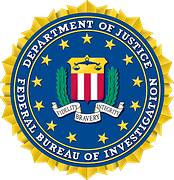 Just two months ago the Blog posted an article about a police officer that was indicted on federal drug conspiracy and robbery charges. That particular officer, a 36-year-old man, will learn his fate at a June 11th sentencing hearing in federal court, and the embarrassing stain of his arrest and prosecution is still fresh on the minds of top cops at the Baltimore City Police Department. But Maryland’s largest police department now faces yet another scandal involving a crooked officer. The United States Attorney’s Office recently announced the filing of criminal charges and the subsequent arrest of a 25-year-old female police officer that hails from Pikesville. The criminal complaint alleges that the woman stood watch in her marked patrol car while a supposed drug dealer completed a heroin sale at a Baltimore area shopping center. The woman also allegedly provided the supposed drug dealer with information about the identity of police informants, which she obtained from department databases. Unfortunately for the soon to be ex-cop, the supposed drug dealer was actually an informant working with the FBI, and the entire transaction is now the basis for a variety of serious felony charges filed against her.
Just two months ago the Blog posted an article about a police officer that was indicted on federal drug conspiracy and robbery charges. That particular officer, a 36-year-old man, will learn his fate at a June 11th sentencing hearing in federal court, and the embarrassing stain of his arrest and prosecution is still fresh on the minds of top cops at the Baltimore City Police Department. But Maryland’s largest police department now faces yet another scandal involving a crooked officer. The United States Attorney’s Office recently announced the filing of criminal charges and the subsequent arrest of a 25-year-old female police officer that hails from Pikesville. The criminal complaint alleges that the woman stood watch in her marked patrol car while a supposed drug dealer completed a heroin sale at a Baltimore area shopping center. The woman also allegedly provided the supposed drug dealer with information about the identity of police informants, which she obtained from department databases. Unfortunately for the soon to be ex-cop, the supposed drug dealer was actually an informant working with the FBI, and the entire transaction is now the basis for a variety of serious felony charges filed against her.
Continue reading →
Polygraph Testing Ordered For Baltimore Jail Officials
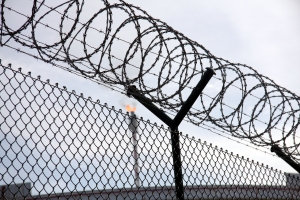 The last time Baltimore was headlining national news articles the Ravens had just completed their unlikely and dramatic run to a Superbowl championship. It’s been a few months, but our great city is back in the national headlines, only this time there is no celebration to be had. On the contrary, the past two weeks have been extremely embarrassing for all those involved with the City’s corrections department, as well as for city and state politicians and government officials. Over the past year law enforcement agencies from the federal and state governments have been investigating allegations of organized gang activity within the walls of the Baltimore City Detention Center. Last week, the United States Attorney unsealed the bombshell indictment that charged various inmates and prison guards with running a large-scale racket within the jail’s walls. The indictment alleged that gang members sold hundreds of thousands of dollars of drugs and other contraband that was smuggled into the jail with the help of 13 corrections officers. Other allegations include bribery, extortion, assault, robbery, witness retaliation, and even murder. All those charged in the federal indictment face lengthy prison sentences for racketeering in addition to the individual criminal acts.
The last time Baltimore was headlining national news articles the Ravens had just completed their unlikely and dramatic run to a Superbowl championship. It’s been a few months, but our great city is back in the national headlines, only this time there is no celebration to be had. On the contrary, the past two weeks have been extremely embarrassing for all those involved with the City’s corrections department, as well as for city and state politicians and government officials. Over the past year law enforcement agencies from the federal and state governments have been investigating allegations of organized gang activity within the walls of the Baltimore City Detention Center. Last week, the United States Attorney unsealed the bombshell indictment that charged various inmates and prison guards with running a large-scale racket within the jail’s walls. The indictment alleged that gang members sold hundreds of thousands of dollars of drugs and other contraband that was smuggled into the jail with the help of 13 corrections officers. Other allegations include bribery, extortion, assault, robbery, witness retaliation, and even murder. All those charged in the federal indictment face lengthy prison sentences for racketeering in addition to the individual criminal acts.
Continue reading →
Baltimore Police Officer Pleads Guilty To Drug Dealing
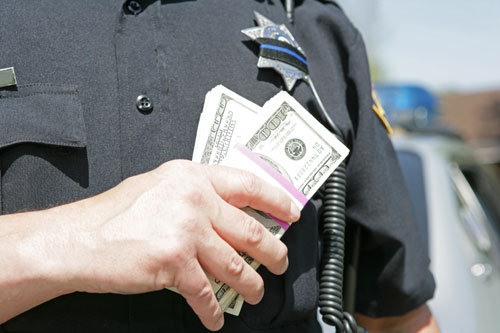 The FBI and the United States Attorney for the District of Maryland recently announced that a 36 year-old Baltimore Police officer has pleaded guilty to multiple drug and gun felonies. The investigation began in early 2012 when the feds received information from an anonymous source that the crooked cop was trafficking in stolen property. As a result of the tip and other corroborating information, feds secured a warrant to wiretap the officer’s cellphone. Through the wiretap law enforcement learned that the officer was selling stolen iPhones, iPads, and other electronics, some of which were confiscated during arrests and never submitted into evidence. Federal investigators also became aware of a new development, that the officer was involved in a more sophisticated and organized criminal scheme with a street level drug dealer.
The FBI and the United States Attorney for the District of Maryland recently announced that a 36 year-old Baltimore Police officer has pleaded guilty to multiple drug and gun felonies. The investigation began in early 2012 when the feds received information from an anonymous source that the crooked cop was trafficking in stolen property. As a result of the tip and other corroborating information, feds secured a warrant to wiretap the officer’s cellphone. Through the wiretap law enforcement learned that the officer was selling stolen iPhones, iPads, and other electronics, some of which were confiscated during arrests and never submitted into evidence. Federal investigators also became aware of a new development, that the officer was involved in a more sophisticated and organized criminal scheme with a street level drug dealer.
The drug dealer was actually a registered confidential informant with the Baltimore Police Department. A confidential informant is basically a civilian who has agreed to provide information to law enforcement and to participate in undercover investigations in exchange for avoiding criminal prosecution him or herself. On the street confidential informants have infamously been known as snitches, and this nickname has even appeared in television shows and movies. This particular confidential informant was a known drug dealer in the Northwest Baltimore area where the officer patrolled, and at some point the two entered into a business agreement. The officer would provide the drug dealer with information on a daily basis when and where it was safe to sell drugs without police interference. The officer was also accused of doctoring police reports by redacting the drug dealer’s name and eliminating his involvement in crimes. In exchange for this protection, the drug dealer would provide the officer with information about other criminal activity, which the officer used to make arrests.
Continue reading →
Feds Bust Large Anne Arundel County Drug Ring
 Federal law enforcement recently announced that a major drug ring in suburban Maryland has been busted up, and numerous arrests have been made. In total, 18 people were arrested in the bust, and as many as 15 have already been charged with conspiracy to distribute more than two thousand pounds of marijuana and various other drugs. The federal grand jury indictment included information, which led federal officers to believe that the Anne Arundel County drug ring distributed cocaine, prescription pills, steroids, as well as large amounts of pot. As many as 250 federal agents participated in multiple raids that reportedly resulted in the seizure of 30 cars, 60 pounds of marijuana, upwards of 300 thousand dollars cash, and multiple guns. The seizures are not even close to complete as the U.S. Justice Department is seeking the court’s approval to confiscate over 10 million dollars in cash, multiple real estate properties, bank accounts, cars, and business assets.
Federal law enforcement recently announced that a major drug ring in suburban Maryland has been busted up, and numerous arrests have been made. In total, 18 people were arrested in the bust, and as many as 15 have already been charged with conspiracy to distribute more than two thousand pounds of marijuana and various other drugs. The federal grand jury indictment included information, which led federal officers to believe that the Anne Arundel County drug ring distributed cocaine, prescription pills, steroids, as well as large amounts of pot. As many as 250 federal agents participated in multiple raids that reportedly resulted in the seizure of 30 cars, 60 pounds of marijuana, upwards of 300 thousand dollars cash, and multiple guns. The seizures are not even close to complete as the U.S. Justice Department is seeking the court’s approval to confiscate over 10 million dollars in cash, multiple real estate properties, bank accounts, cars, and business assets.
The yearlong investigation that led to the recent bust began rather fortuitously for law enforcement. Last year around this time, a Glen Burnie man was involved in a serious car accident, and upon arriving on the scene police found over a pound of marijuana and a money counting machine. Cops also found papers detailing the operation, which ultimately spear headed the investigation. Over the next 12 months federal authorities learned about a highly complex interstate organization that was complete with stash houses to store the drugs, and shell corporations to launder the profits. Cops also learned that the drugs were shipped, driven, and even flown to Baltimore from California and New Jersey. Authorities reported that the alleged traffickers were bold enough to fly the drugs into BWI airport during the operation.
Continue reading →
Medical Marijuana Supporters Prepare For 2013 Legislative Session
 The Maryland Legislature is scheduled to begin its 2013 legislative session next month, and marijuana is one issue that is sure to be hotly debated. Medical marijuana supporters and personal use advocates alike hope that this year’s session makes more progress in the fight for decriminalization. Toward the end of last year’s legislative session, the head of the state’s department of health went on record saying that he would not support decriminalization as long as federal law continued to define pot as an illegal controlled substance. The department head cited concerns that his state employees could be subject to federal prosecution under the controlled substances act and there would be nothing the state could do to protect them. The head of any state agency has a duty to protect his or her employees, but the broader issue is also that state lawmakers want to protect their constituents as well. It would certainly not look good for Annapolis if Maryland citizens were being prosecuted federally for following a law that their own delegates supported and eventually passed. But supporters of marijuana decriminalization have hope that this year will be different based on two influential votes on this past Election Day.
The Maryland Legislature is scheduled to begin its 2013 legislative session next month, and marijuana is one issue that is sure to be hotly debated. Medical marijuana supporters and personal use advocates alike hope that this year’s session makes more progress in the fight for decriminalization. Toward the end of last year’s legislative session, the head of the state’s department of health went on record saying that he would not support decriminalization as long as federal law continued to define pot as an illegal controlled substance. The department head cited concerns that his state employees could be subject to federal prosecution under the controlled substances act and there would be nothing the state could do to protect them. The head of any state agency has a duty to protect his or her employees, but the broader issue is also that state lawmakers want to protect their constituents as well. It would certainly not look good for Annapolis if Maryland citizens were being prosecuted federally for following a law that their own delegates supported and eventually passed. But supporters of marijuana decriminalization have hope that this year will be different based on two influential votes on this past Election Day.
As readers of this blog and those who have been following national drug laws are aware, Colorado and Washington State voted to decriminalize personal marijuana use. Both states, and close to 20 others including Washington D.C. already had medical marijuana laws on the books, but this past election took the movement to new heights. Local advocates back here in Maryland are now optimistic that the legislature will consider the Colorado and Washington laws in crafting their own legislation. Obviously we cannot expect that Annapolis will jump on board with personal use decriminalization, but medical marijuana laws in this year’s session are a distinct possibility. There is no official word from the Governor’s office to date that would indicate which way O’Malley is leaning, and his future political aspirations could play into his decision to support a medical use law. A politician with greater aspirations is likely to be more conservative in his or her final years. For now though, lobbyists, grass roots advocates, and users have some reason for optimism.
Continue reading →
Feds Crack Down On Shipping Marijuana To Maryland
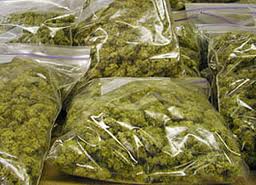 Various states have recently been modifying and in some cases eradicating criminal penalties for marijuana possession and manufacturing. As a result law enforcement has seen an uptick in shipping the drug from a state where it is legal to a state that has yet to join the legalization party. Despite recent modifications in the controlled dangerous substance laws, marijuana continues to be illegal under state law, and thus local and federal law enforcement have focused a great deal of attention on intercepting packaged drugs headed toward Maryland. Recently a large number of federal search warrants were unsealed in Baltimore, allowing the public to take a look inside the process and procedure of apprehending suspects that take delivery of packaged drugs.
Various states have recently been modifying and in some cases eradicating criminal penalties for marijuana possession and manufacturing. As a result law enforcement has seen an uptick in shipping the drug from a state where it is legal to a state that has yet to join the legalization party. Despite recent modifications in the controlled dangerous substance laws, marijuana continues to be illegal under state law, and thus local and federal law enforcement have focused a great deal of attention on intercepting packaged drugs headed toward Maryland. Recently a large number of federal search warrants were unsealed in Baltimore, allowing the public to take a look inside the process and procedure of apprehending suspects that take delivery of packaged drugs.
Mailing drugs such as marijuana, cocaine, and ecstasy from state to state is not a new method of drug distribution. Drug traffickers and even personal users have been utilizing the mail for decades as a seemingly safer alternative to transporting drugs via car or plane. But now that some states have legalized marijuana for medical use, and even for non-medical personal use, shipping pot by mail has taken off. The mail trend likely gained popularity when California legalized marijuana cultivation for medical use over ten years ago. This immediately caused the price of pot to drop 3 or 4 times below its traditional street value, and the current street value in many East Coast states such as Maryland. Nowadays you can purchase a pound of high quality pot for as little as $1,000 in California, whereas throughout the Midwest and along the East Coast a pound still goes for over $3,000. Personal users and dealers alike can do the simple math and figure out the benefits of getting their supply from the West Coast. And with ramped up airport security as well as K9 patrols along the interstate highways, not to mention the price of gas, it simply pays for some people to take the risk of mailing their stash.
Continue reading →
 Criminal Defense Lawyer Blog
Criminal Defense Lawyer Blog

